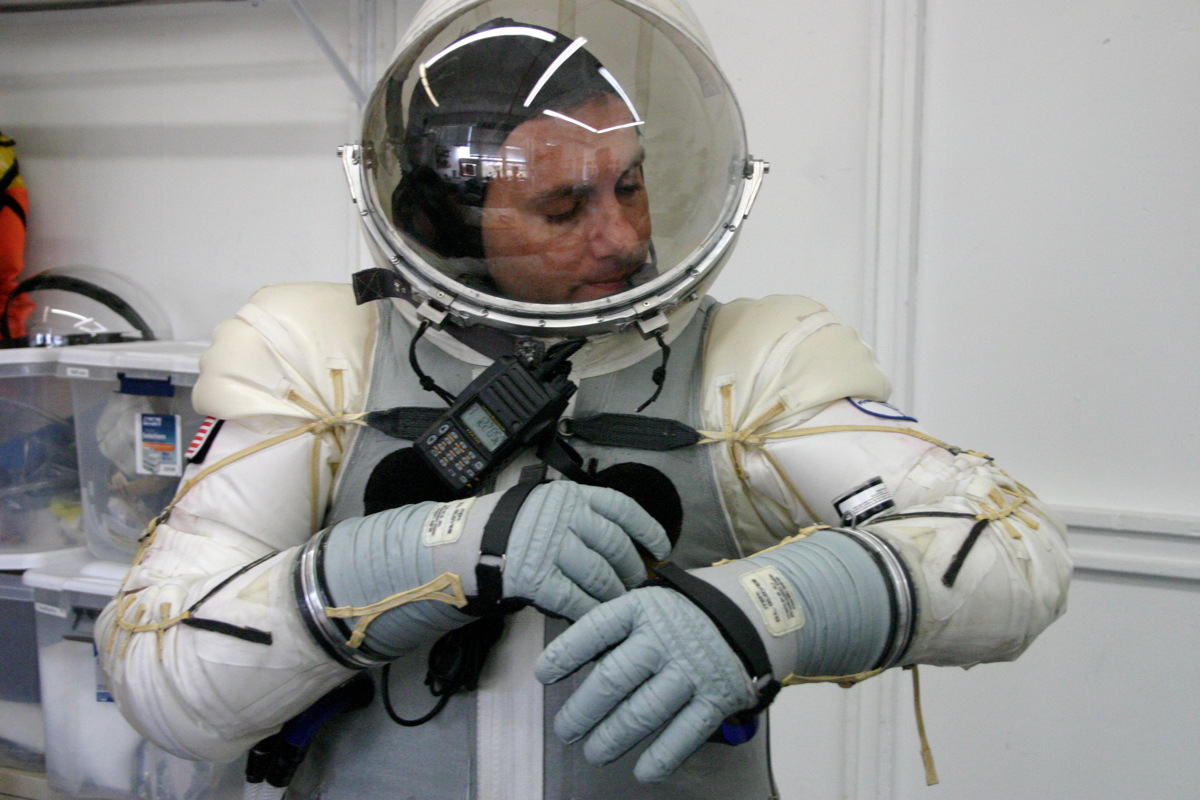Private Astronaut Training Company Picks Spacesuits for Spacewalk Simulator

A private spacesuit company and an astronaut-training organization are teaming up to give private astronauts on simulated spacewalks a more spacelike experience.
With a Kickstarter campaign underway to simulate spacewalks on Earth, Houston's Waypoint 2 Space announced a new partnership to integrate spacesuit design ideas with the simulator. The company plans to work with Brooklyn-based Final Frontier Design to integrate life support systems into the spacewalk simulator and other training systems.
"Our experts looked at several excellent space suit designs along with ways to incorporate these life support systems into our core pre-suborbital program," said Kelly Soich, director of programs and chief payload specialist for Waypoint, in a press release. "In the end, FFD [Final Frontier Design] presented an innovative solution, embodying the core efforts of commercial space and providing us the capability to maximize spaceflight training for a large segment of the population." [Photos of Final Frontier Design's Private Spacesuit]
Final Frontier Design was founded after winning the NASA 2009 Astronaut Glove Challenge. Ted Southern and Nikolay Moiseev, former competitors in a NASA glove challenge, teamed up to run the company. Their business also offers a spacesuit "experience" that allows anyone to don the pressurized garment and move around.
"Waypoint to Space embodies a forward-looking, ambitious, 21st century space-training doctrine, one which embraces high-technology solutions and maintains cost-effective infrastructure, while most importantly, opening outer space to the public," Southern, Final Frontier's president, said in a statement. "We are excited to participate in the future with them."
The partnership news comes about three weeks into Waypoint 2 Space's Kickstarter campaign to create the simulator. The group has raised about $8,832 of its $83,000 goal for the campaign, which wraps up Nov. 8. The simulator would be available to amateur spacewalkers in March 2015. You can find out more about the Kickstarter campaign here: https://www.kickstarter.com/projects/waypoint2space/spacewalking-on-earth
The completed simulator will sit inside a dark room and will be able to move horizontally and vertically. Trainees will use their spacesuit lights to figure out where to move. Waypoint representatives will also project star fields on the walls of the room to enhance the sensation that the amateur astronauts are in space.
Breaking space news, the latest updates on rocket launches, skywatching events and more!
At the moment, most spacewalking training is limited to professional astronauts who have access to facilities such as NASA's Neutral Buoyancy Laboratory, which is a giant pool in Houston with a mock space station inside.
Follow Elizabeth Howell @howellspace. Follow us @Spacedotcom, Facebook and Google+. Original article on Space.com.

Elizabeth Howell (she/her), Ph.D., was a staff writer in the spaceflight channel between 2022 and 2024 specializing in Canadian space news. She was contributing writer for Space.com for 10 years from 2012 to 2024. Elizabeth's reporting includes multiple exclusives with the White House, leading world coverage about a lost-and-found space tomato on the International Space Station, witnessing five human spaceflight launches on two continents, flying parabolic, working inside a spacesuit, and participating in a simulated Mars mission. Her latest book, "Why Am I Taller?" (ECW Press, 2022) is co-written with astronaut Dave Williams.
